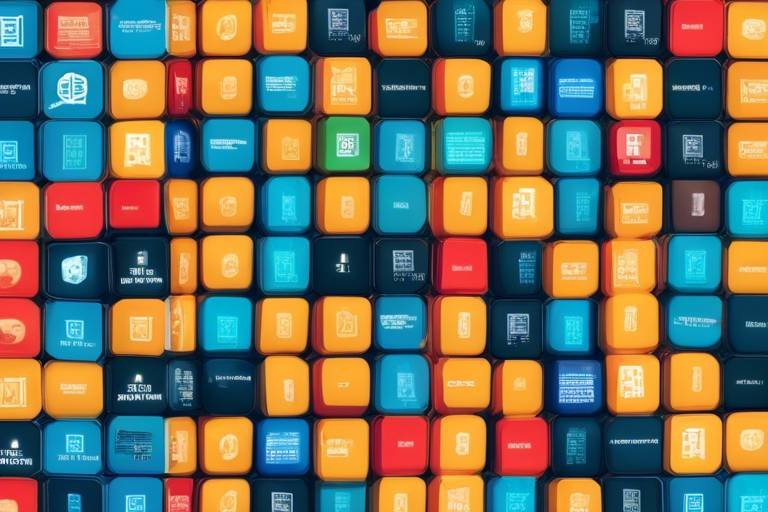How Blockchain is Transforming the Rental Market
In a world where technology is evolving at an unprecedented pace, the rental market is not left behind. Enter blockchain technology, a revolutionary force that is reshaping how landlords and tenants interact. Imagine a system where trust is built into every transaction, where fraud is virtually eliminated, and where processes are streamlined to save time and money. Sounds like a dream, right? Well, it's becoming a reality, and this article will delve into the transformative impact of blockchain on the rental market.
Before we dive deeper, let’s clarify what blockchain is. At its core, blockchain is a decentralized digital ledger that records transactions across many computers. This means that no single entity has control over the entire chain, making it resistant to fraud and tampering. The principles of decentralization, immutability, and transparency are crucial here. When these principles are applied to the rental market, they enhance trust between landlords and tenants, which is often a fragile relationship. By using blockchain, every transaction is recorded in a way that is permanent and publicly verifiable, fostering a sense of security for all parties involved.
So, what’s in it for landlords and tenants? The benefits of blockchain in the rental market are numerous and significant. First off, it drastically reduces the chances of fraud. With immutable records, any attempt to alter rental agreements or payment histories becomes nearly impossible. Furthermore, transaction costs are lowered since the need for intermediaries—like banks or real estate agents—is minimized. This leads to a more efficient rental experience. Here are some of the standout benefits:
- Reduced Fraud: Immutable records deter dishonest practices.
- Lower Transaction Costs: Fewer intermediaries mean more money in your pocket.
- Expedited Processes: Quick and efficient transactions save time for everyone.
By leveraging these advantages, both landlords and tenants can enjoy a more seamless rental experience.
Now, let’s talk about smart contracts. These are self-executing contracts with the terms of the agreement directly written into code. Imagine a vending machine: you insert money, make a selection, and the machine automatically delivers your snack. Smart contracts work similarly in the rental market. They automate rental agreements, ensuring that both parties adhere to the terms without the need for a middleman. This not only ensures compliance but also significantly reduces disputes. For instance, if a tenant pays their rent on time, the smart contract automatically renews the lease, eliminating the need for constant communication and paperwork.
However, it’s not all sunshine and rainbows. Implementing blockchain in the rental market does come with its fair share of challenges. Regulatory hurdles can be daunting, as laws surrounding digital transactions are still evolving. Additionally, there are technological barriers—not everyone is tech-savvy, and the transition from traditional systems to blockchain can be intimidating. Lastly, there’s the resistance to change. Many individuals and businesses are hesitant to adopt new technologies, especially when they’ve been doing things a certain way for years. Addressing these challenges will be crucial for the widespread adoption of blockchain in rentals.
Real-world examples can shed light on the effectiveness of blockchain in the rental market. Take, for instance, a startup that has successfully implemented blockchain to manage rental agreements. They have created a platform where landlords can easily list properties, and tenants can securely submit applications and payments. This not only streamlines the process but also builds trust through transparent records. Such case studies highlight the potential of blockchain to solve traditional rental issues, paving the way for a more efficient future.
The future looks bright for blockchain in the rental market. Emerging trends suggest that we will see increased adoption, particularly as more people become aware of its benefits. Additionally, the integration of blockchain with the Internet of Things (IoT) could revolutionize property management. Imagine smart homes that automatically report maintenance issues to landlords through blockchain. Enhanced data privacy is also on the horizon, allowing tenants to control who accesses their information. The possibilities are endless!
As we look at the evolution of rental agreements, it’s clear that blockchain is making them more secure and efficient. Traditional agreements are often lengthy and complicated, but with blockchain, they can be transformed into concise digital formats that enhance trust. This simplification not only makes the leasing process smoother but also empowers tenants and landlords alike.
As blockchain technology continues to evolve, its impact on the rental market will likely grow exponentially. By embracing this technology, landlords and tenants can look forward to a future of improved transparency, efficiency, and security. The rental landscape is changing, and those who adapt will undoubtedly reap the rewards.
Q: What is blockchain technology?
A: Blockchain is a decentralized digital ledger that records transactions across many computers, ensuring security and transparency.
Q: How does blockchain reduce fraud in rentals?
A: Blockchain creates immutable records, making it extremely difficult to alter rental agreements or payment histories.
Q: What are smart contracts?
A: Smart contracts are self-executing agreements with the terms written into code, automating the rental process and reducing disputes.
Q: What challenges does blockchain face in the rental market?
A: Challenges include regulatory hurdles, technological barriers, and resistance to change from traditional practices.
Q: How can blockchain improve the future of rentals?
A: Blockchain can streamline processes, enhance data privacy, and integrate with IoT for smarter property management.

The Basics of Blockchain Technology
Understanding blockchain technology is crucial for grasping its applications in the rental market. At its core, blockchain is a decentralized digital ledger that records transactions across multiple computers in such a way that the registered transactions cannot be altered retroactively. This feature is what makes blockchain so powerful and trustworthy. Imagine a digital notebook that everyone can see but no one can erase or change without consensus. This analogy encapsulates the essence of blockchain—transparency and trust in a world often plagued by doubts and uncertainties.
One of the most significant principles of blockchain is decentralization. Traditional systems often rely on a central authority to validate transactions, which can lead to bottlenecks and inefficiencies. In contrast, blockchain distributes the control across a network of nodes, ensuring that no single entity has power over the entire system. This decentralization not only enhances security but also fosters a collaborative environment where all participants have equal access to information.
Another key feature of blockchain is immutability. Once a transaction is recorded on the blockchain, it becomes nearly impossible to alter or delete it. This characteristic is akin to carving your name into stone; it stands the test of time and is resistant to tampering. For landlords and tenants, this means that rental agreements and payment histories are securely documented, reducing the likelihood of disputes and fraud.
Moreover, the transparency offered by blockchain is revolutionary. All transactions are visible to participants in the network, creating an environment of accountability. This transparency can significantly reduce the chances of fraud in rental agreements, as both parties can verify the legitimacy of transactions in real-time. Imagine being able to check the entire history of a property’s rental agreements with just a few clicks—this is the future that blockchain promises.
To summarize, the fundamental principles of blockchain—decentralization, immutability, and transparency—are essential for enhancing trust in rental transactions. As we delve deeper into the benefits and applications of this technology, it becomes clear that blockchain is not just a passing trend; it's a transformative force in the rental market that can lead to more secure, efficient, and trustworthy transactions.

Benefits of Blockchain in Rentals
When it comes to the rental market, the introduction of blockchain technology is like a breath of fresh air. Imagine a world where transactions are not only secure but also incredibly efficient. That’s exactly what blockchain brings to the table. By eliminating the middlemen and providing a decentralized platform, blockchain enhances the overall experience for both landlords and tenants. Let's dive into some of the most significant benefits that this technology offers.
One of the standout advantages of blockchain in rentals is the substantial reduction in fraud. Traditional rental processes can be riddled with scams, whether it's fake listings or dishonest landlords. However, with blockchain's immutable ledger, every transaction is recorded permanently and transparently. This means that both parties can verify the legitimacy of the rental agreement, reducing the chances of falling victim to fraudulent activities. It's like having a digital notary that everyone can trust!
Moreover, blockchain technology can lead to significantly lower transaction costs. By cutting out intermediaries, such as real estate agents and banks, the costs associated with renting can be reduced dramatically. This not only benefits landlords, who can enjoy higher profit margins, but also tenants, who can save money on fees that would otherwise inflate their rental costs. It’s a win-win situation that makes renting more accessible to everyone.
In addition to reducing costs, blockchain also expedites processes. Traditional rental agreements can take days or even weeks to finalize, with back-and-forth negotiations and paperwork. With blockchain, smart contracts can automate these processes. For instance, once both parties agree to the terms, the contract can be executed instantly, allowing tenants to move in sooner and landlords to receive their payments faster. Imagine being able to sign a lease and get the keys within minutes instead of days!
Another crucial benefit of blockchain in rentals is its ability to enhance transparency. In a conventional rental market, it’s often unclear how much of the rent goes to management fees or maintenance costs. Blockchain provides a clear view of all transactions, allowing tenants to understand exactly what they are paying for. This transparency fosters trust between landlords and tenants, creating a more harmonious rental experience.
Lastly, the integration of blockchain with other technologies, like the Internet of Things (IoT), can further improve the rental experience. For example, smart home devices can be linked to the blockchain, allowing for automated rent payments based on usage metrics. This level of integration not only simplifies the rental process but also enhances the overall living experience for tenants.
In summary, the benefits of blockchain in the rental market are profound. From reducing fraud and costs to expediting processes and enhancing transparency, this technology is paving the way for a more efficient and trustworthy rental experience. As we continue to embrace these innovations, we can expect a future where renting is not just easier but also more secure.
- What is blockchain technology? Blockchain is a decentralized digital ledger that records transactions across multiple computers, ensuring that the information is secure and immutable.
- How does blockchain reduce fraud in rentals? By providing a transparent and immutable record of all transactions, blockchain allows both landlords and tenants to verify the legitimacy of rental agreements, reducing the risk of scams.
- Can blockchain lower rental costs? Yes, by eliminating intermediaries and associated fees, blockchain can lead to lower transaction costs for both landlords and tenants.
- What are smart contracts? Smart contracts are self-executing contracts with the terms directly written into code, allowing for automated transactions and reducing disputes.
- How can blockchain improve transparency in rentals? Blockchain provides a clear view of all transactions, allowing tenants to understand exactly what they are paying for, which fosters trust between parties.

Smart Contracts Explained
In the rapidly evolving landscape of technology, smart contracts stand out as a groundbreaking innovation that is reshaping the way we approach agreements, particularly in the rental market. But what exactly are smart contracts? Imagine a traditional lease agreement, but instead of being penned on paper and signed with ink, it exists as lines of code on a blockchain. This means that the terms of the agreement are not only transparent but also automatically enforced, reducing the need for intermediaries and minimizing the potential for disputes.
Smart contracts are essentially self-executing contracts where the terms of the agreement are directly written into code. When certain conditions are met, the contract executes automatically. For instance, if a tenant pays their rent on time, the smart contract could automatically release access to the rental property or trigger a confirmation receipt. This level of automation creates a seamless experience for both landlords and tenants, eliminating the common frustrations associated with traditional rental agreements.
One of the most significant advantages of using smart contracts in the rental market is the enhancement of trust and transparency. Both parties can view the contract terms at any time and know that they cannot be altered without mutual consent. This immutability is a game-changer, as it significantly lowers the risk of fraud. In fact, a study found that over 30% of rental disputes arise from misunderstandings regarding contract terms. By using smart contracts, these misunderstandings can be greatly reduced.
Moreover, the efficiency of smart contracts cannot be overstated. They can drastically shorten the time it takes to finalize a rental agreement. Instead of waiting for paperwork to be drafted, signed, and returned, everything can happen in real-time. This is particularly beneficial in competitive rental markets where time is of the essence. Imagine being able to secure a rental property with just a few clicks, all while knowing that the terms are being adhered to automatically.
However, it's essential to understand that while smart contracts offer numerous benefits, they do come with their own set of challenges. For instance, the initial setup requires a certain level of technical expertise, and both landlords and tenants need to be educated about how these contracts work. Additionally, the legal status of smart contracts is still evolving, and there may be regulatory hurdles to overcome before widespread adoption can occur.
To illustrate the potential of smart contracts in the rental market, consider the following table that outlines their key features and benefits:
| Feature | Benefit |
|---|---|
| Automation | Reduces the need for intermediaries, speeding up the rental process. |
| Transparency | Both parties can view contract terms, reducing misunderstandings. |
| Immutability | Once executed, contract terms cannot be changed without consent, enhancing trust. |
| Cost-Effectiveness | Lower transaction costs by eliminating paperwork and administrative fees. |
In conclusion, smart contracts represent a significant leap forward in the rental market, offering a blend of efficiency, transparency, and security. As more landlords and tenants become aware of their benefits, we can expect to see a shift towards this innovative approach, paving the way for a more streamlined rental experience.
- What are smart contracts? Smart contracts are self-executing contracts with the terms of the agreement written into code, automatically executing when conditions are met.
- How do smart contracts enhance trust? They provide transparency and immutability, ensuring that contract terms cannot be altered without mutual consent.
- Are smart contracts legally binding? The legal status of smart contracts is still evolving, but they are increasingly recognized in various jurisdictions.
- What challenges exist with smart contracts? Challenges include the need for technical expertise, understanding of the technology, and potential regulatory hurdles.

Challenges of Implementing Blockchain
Implementing blockchain technology in the rental market is not without its hurdles. While the benefits are clear, the road to adoption is paved with significant challenges that must be addressed. One of the primary obstacles is regulatory hurdles. Governments around the world are still figuring out how to regulate blockchain and cryptocurrency, leading to uncertainty for landlords and tenants alike. This uncertainty can deter businesses from investing in blockchain solutions, fearing potential legal ramifications.
Another challenge is the technological barrier. Many landlords and property managers may lack the technical expertise required to implement blockchain systems. The concept of decentralization and the intricacies of smart contracts can be daunting for those who are not tech-savvy. This knowledge gap creates a barrier to entry, making it difficult for smaller landlords to adopt this transformative technology.
Moreover, there is a significant resistance to change within the industry. The rental market has operated in a certain way for decades, and many stakeholders are comfortable with traditional methods. Convincing them to switch to a blockchain-based system can be a tough sell. The fear of the unknown often leads to skepticism, which can slow down the adoption process.
To illustrate these challenges further, let’s look at a few key points:
- Regulatory Uncertainty: Various jurisdictions have different regulations regarding blockchain technology, which complicates its implementation.
- Technical Expertise: A lack of understanding and expertise in blockchain technology can hinder its adoption among landlords and property managers.
- Industry Resistance: Many stakeholders are hesitant to change established practices, fearing disruption and potential loss of business.
Despite these challenges, solutions are emerging. Educational initiatives and workshops aimed at landlords and property managers can bridge the knowledge gap. Additionally, collaborations between tech companies and regulatory bodies can help create a clearer framework for blockchain use in rentals. As more success stories emerge, the industry may gradually become more receptive to this innovative technology.
In conclusion, while the challenges of implementing blockchain in the rental market are significant, they are not insurmountable. With the right approach, education, and regulatory clarity, the rental market can harness the full potential of blockchain technology, paving the way for a more transparent, efficient, and secure rental experience.

Case Studies of Blockchain in Rentals
As we dive into the real-world applications of blockchain technology in the rental market, it's fascinating to see how innovative companies are leveraging this transformative tool to address longstanding issues. One standout case is that of Rentberry, a rental platform that utilizes blockchain to streamline the leasing process. Rentberry enables tenants to submit their rental applications with all necessary documents securely stored on the blockchain. This not only accelerates the application process but also significantly reduces the chances of fraud, as all information is immutable and easily verifiable.
Another compelling example is Propy, which has pioneered the use of blockchain for real estate transactions, including rentals. Propy's platform allows landlords and tenants to engage in transactions that are recorded on the blockchain, ensuring transparency and security. By automating the rental agreement process through smart contracts, Propy minimizes disputes and enhances compliance with the terms of the lease. This case highlights the potential for blockchain to create a more trustworthy environment for both parties involved.
Moreover, Property Vault is another noteworthy player in this space. They are utilizing blockchain to create a decentralized marketplace for rental properties. This platform allows landlords to list their properties while providing tenants with access to verified listings. By using blockchain, Property Vault ensures that all listings are authentic and that tenant information remains confidential and secure. This not only builds trust but also enhances the overall rental experience.
To illustrate these case studies further, let's take a quick look at a comparison of key features offered by these platforms:
| Platform | Key Features | Benefits |
|---|---|---|
| Rentberry | Secure rental applications, document storage | Reduced fraud, faster processing |
| Propy | Blockchain transactions, smart contracts | Enhanced transparency, minimized disputes |
| Property Vault | Decentralized marketplace, verified listings | Increased trust, privacy protection |
These case studies showcase how blockchain technology is not just a futuristic concept but is actively reshaping the rental landscape today. By addressing issues of trust, efficiency, and security, these platforms demonstrate the tangible benefits that blockchain can bring to both landlords and tenants. As more companies adopt this technology, we can expect to see even greater advancements in the rental market, paving the way for a more seamless and trustworthy experience.
- What is blockchain technology?
Blockchain is a decentralized ledger technology that records transactions across many computers in a way that ensures the recorded transactions cannot be altered retroactively. - How does blockchain reduce fraud in rentals?
By storing rental agreements and tenant information on a secure and immutable ledger, blockchain makes it incredibly difficult for fraudulent activities to occur. - What are smart contracts?
Smart contracts are self-executing contracts with the terms of the agreement directly written into code, allowing for automatic enforcement without the need for intermediaries. - Are there challenges to implementing blockchain in rentals?
Yes, challenges include regulatory hurdles, technological barriers, and resistance to change from traditional practices.

Future Trends in Blockchain Rentals
The future of blockchain technology in the rental market is not just a passing trend; it's a revolution that is set to reshape how landlords and tenants interact. As we look forward, there are several exciting trends emerging that promise to enhance the rental experience, making it more efficient, secure, and user-friendly. One of the most significant trends is the increased adoption of blockchain technology across various rental platforms. As more stakeholders recognize the benefits of blockchain, we can expect to see a surge in its implementation, leading to a more standardized approach to rental agreements and transactions.
Another fascinating development is the integration of blockchain with Internet of Things (IoT) devices. Imagine a smart home where your rental payments are automatically deducted from your crypto wallet, and your smart lock only unlocks when the payment is confirmed on the blockchain. This kind of seamless interaction between technology and rental agreements can create a hassle-free experience for tenants while providing landlords with peace of mind regarding timely payments.
Moreover, the emphasis on data privacy is becoming increasingly important. With the rise of data breaches and privacy concerns, blockchain's inherent security features can serve as a robust solution. By utilizing blockchain, rental platforms can ensure that personal data is encrypted and only accessible to authorized parties. This not only builds trust between landlords and tenants but also aligns with growing regulatory requirements regarding data protection.
We can also anticipate a shift towards decentralized rental marketplaces. Currently, many rental transactions are facilitated through centralized platforms that charge hefty fees. However, blockchain enables the creation of decentralized platforms where landlords and tenants can connect directly, eliminating intermediaries. This could lead to lower costs for both parties and a more transparent rental process.
Lastly, as blockchain technology matures, we might see the emergence of tokenization of rental properties. This concept involves creating digital tokens that represent ownership or shares in a property. This could open up investment opportunities for individuals who may not have the capital to purchase entire properties, thereby democratizing real estate investment and allowing more people to participate in the rental market.
In summary, the future of blockchain in the rental market is filled with potential. From increased adoption and IoT integration to enhanced data privacy and decentralized marketplaces, the possibilities are endless. As we embrace these changes, the rental experience will undoubtedly become more streamlined, secure, and equitable for everyone involved.
- What are the main benefits of using blockchain in rentals? Blockchain enhances transparency, reduces fraud, and lowers transaction costs.
- How do smart contracts work in the rental market? Smart contracts execute automatically when conditions are met, ensuring compliance and reducing disputes.
- What challenges does blockchain face in the rental market? Challenges include regulatory hurdles, technological barriers, and resistance to change.
- Will blockchain completely replace traditional rental agreements? While it may not completely replace them, it will significantly improve their efficiency and security.

Impact on Rental Agreements
Blockchain technology is revolutionizing the way rental agreements are created, executed, and managed. Traditionally, rental agreements have been cumbersome documents filled with legal jargon, often leading to misunderstandings and disputes between landlords and tenants. However, with the advent of blockchain, these agreements are evolving into more secure and efficient digital formats.
One of the most significant impacts of blockchain on rental agreements is the introduction of smart contracts. These self-executing contracts contain the terms of the agreement directly written into code. This means that once the conditions are met—like payment being made—the contract automatically executes, eliminating the need for intermediaries. This not only speeds up the process but also reduces the chances of fraud and miscommunication.
Additionally, blockchain enhances transparency in rental agreements. Both parties can access the same information in real-time, ensuring that everyone is on the same page. For instance, if a landlord needs to check whether a tenant has made their rent payment, they can do so instantly without waiting for bank confirmations or relying on third-party services. This level of transparency builds trust and fosters a more harmonious relationship between landlords and tenants.
Moreover, blockchain technology allows for the secure storage of rental agreements. Instead of having physical copies that can be lost or damaged, agreements can be stored on the blockchain, making them immutable and easily retrievable. This not only protects the interests of both parties but also simplifies the process of managing multiple agreements, especially for landlords with numerous properties.
To illustrate the impact of blockchain on rental agreements, consider the following table that compares traditional rental agreements with blockchain-enhanced agreements:
| Aspect | Traditional Rental Agreements | Blockchain-Enhanced Agreements |
|---|---|---|
| Execution | Manual execution requiring signatures | Automatic execution through smart contracts |
| Transparency | Limited visibility; potential for disputes | Real-time visibility; reduced disputes |
| Storage | Physical copies; risk of loss | Secure digital storage; immutable records |
| Cost | Higher costs due to intermediaries | Lower costs with reduced need for intermediaries |
As we move forward, the impact of blockchain on rental agreements will likely grow even more profound. The technology not only simplifies the leasing process but also enhances the overall experience for landlords and tenants alike. Imagine a world where disputes are minimized, payments are automated, and agreements are stored securely and transparently. This is not just a dream; it's becoming a reality thanks to blockchain.
- What is a smart contract? A smart contract is a self-executing contract with the terms of the agreement directly written into code, allowing for automatic execution when conditions are met.
- How does blockchain improve transparency? Blockchain allows both landlords and tenants to access the same information in real-time, reducing misunderstandings and fostering trust.
- Are blockchain rental agreements secure? Yes, blockchain provides secure storage for agreements, making them immutable and easily retrievable, thus protecting both parties' interests.

Conclusion: The Road Ahead
As we stand on the brink of a new era in the rental market, it's clear that blockchain technology is not just a passing trend; it's a transformative force that promises to reshape how landlords and tenants interact. The potential benefits of blockchain are immense, offering solutions to long-standing issues like fraud, inefficiency, and lack of transparency. Imagine a world where every rental transaction is recorded on an immutable ledger, where disputes can be resolved swiftly through smart contracts, and where trust is built into the very fabric of the rental process. This is not a distant dream; it's becoming a reality.
However, it’s essential to acknowledge the challenges that lie ahead. Regulatory hurdles, technological limitations, and resistance to change are significant obstacles that must be navigated. But with the growing interest in decentralized solutions, there is a strong momentum building to address these issues. Education will play a crucial role in this transition; as more stakeholders understand blockchain's capabilities, the faster we can overcome these challenges.
Looking to the future, we can expect the integration of blockchain with other emerging technologies, such as the Internet of Things (IoT). This fusion will not only enhance the efficiency of rental processes but also provide new avenues for data security and privacy. For instance, smart homes equipped with IoT devices can automatically update rental agreements or notify landlords of maintenance issues, all recorded securely on the blockchain.
In summary, the road ahead for blockchain in the rental market is filled with promise. The key will be to embrace this technology, adapt to the changes it brings, and leverage its full potential. By doing so, we can create a rental environment that is not only more efficient but also more equitable for all parties involved. The future is bright, and it’s time to get on board!
- What is blockchain technology?
Blockchain is a decentralized digital ledger that records transactions across many computers, ensuring that the record cannot be altered retroactively. - How does blockchain reduce fraud in rentals?
By providing a transparent and immutable record of rental transactions, blockchain significantly decreases the opportunity for fraudulent activities. - What are smart contracts?
Smart contracts are self-executing contracts with the terms of the agreement directly written into code, automating the execution of rental agreements. - What challenges does blockchain face in the rental market?
Challenges include regulatory issues, technological barriers, and resistance from traditional industry players. - What does the future hold for blockchain in rentals?
The future looks promising with increased adoption, integration with IoT, and improvements in data privacy and security.
Frequently Asked Questions
- What is blockchain technology?
Blockchain technology is a decentralized digital ledger that records transactions across many computers. This means that once a transaction is recorded, it cannot be altered retroactively, ensuring transparency and security.
- How does blockchain benefit the rental market?
Blockchain enhances the rental market by reducing fraud, lowering transaction costs, and speeding up processes. This creates a more efficient experience for both landlords and tenants, making transactions smoother and more reliable.
- What are smart contracts?
Smart contracts are self-executing contracts where the terms are written into code. They automatically enforce and execute the terms of a rental agreement, which helps reduce disputes and ensures compliance between landlords and tenants.
- What challenges does blockchain face in the rental market?
Implementing blockchain in the rental market comes with challenges such as regulatory hurdles, technological barriers, and resistance to change. Overcoming these obstacles is crucial for widespread adoption.
- Can you provide examples of blockchain in rentals?
Yes! There are several case studies where blockchain has been successfully implemented in the rental market. These examples showcase how the technology addresses traditional rental issues, improving trust and efficiency.
- What does the future hold for blockchain in rentals?
The future looks bright for blockchain in the rental market, with trends pointing towards increased adoption, integration with IoT devices, and enhanced data privacy. This evolution promises to further transform the rental landscape.
- How are rental agreements changing with blockchain?
Rental agreements are becoming more secure and efficient through blockchain technology. Traditional agreements are evolving into digital formats that enhance trust and simplify the leasing process, making it easier for all parties involved.



















